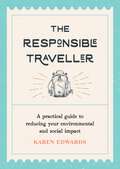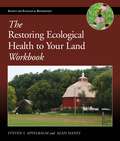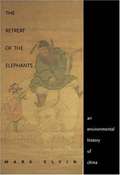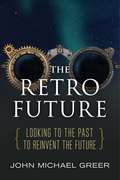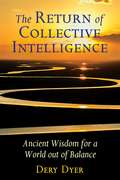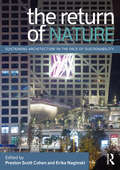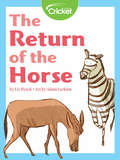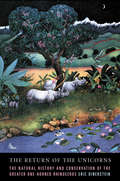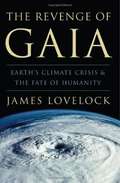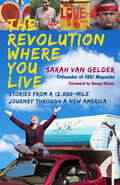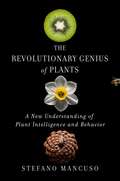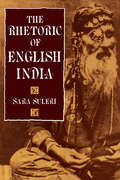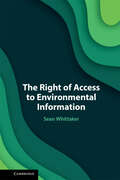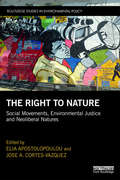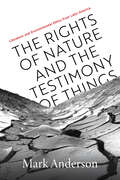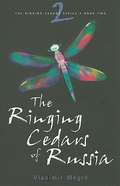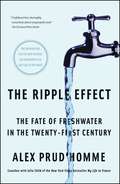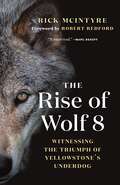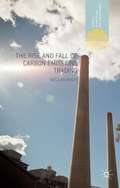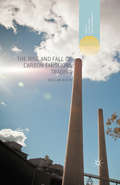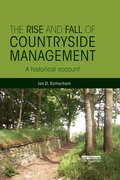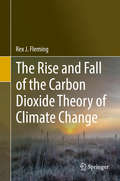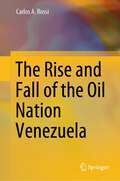- Table View
- List View
The Responsible Traveller: A Practical Guide to Reducing Your Environmental and Social Impact, Embracing Sustainable Tourism and Travelling the World With a Conscience
by Karen EdwardsThe Responsible Traveller is your ticket to sustainable and ethical travel. This pocket-sized book provides the knowledge and tools that can help you to explore the world with a lighter footprint.Whether you travel out of curiosity, to find respite, to remind yourself of how vast and wonderful our planet is, or in search of life-shaping adventures, having the freedom to explore can be exhilarating and hugely rewarding. However we owe it to the people, cultures, ecosystems and wildlife that we encounter along the way to travel with respect; to preserve our beautiful world for generations to come.The Responsible Traveller will show you how to make actionable changes that result in more thoughtful and adventurous travels, while also doing our very best for Planet Earth. Through case studies and storytelling, you’ll learn about the environmental and social effects of tourism and gain a deeper understanding of cultural sensitivity. And through simple, achievable tips and practical lifestyle changes, you’ll discover how you can make an almighty difference in reducing your impact. Empowered with this information, perhaps your next adventure will be inspired by consideration, understanding and compassion.
The Responsible Traveller: A Practical Guide to Reducing Your Environmental and Social Impact, Embracing Sustainable Tourism and Travelling the World With a Conscience
by Karen EdwardsThe Responsible Traveller is your ticket to sustainable and ethical travel. This pocket-sized book provides the knowledge and tools that can help you to explore the world with a lighter footprint.Whether you travel out of curiosity, to find respite, to remind yourself of how vast and wonderful our planet is, or in search of life-shaping adventures, having the freedom to explore can be exhilarating and hugely rewarding. However we owe it to the people, cultures, ecosystems and wildlife that we encounter along the way to travel with respect; to preserve our beautiful world for generations to come.The Responsible Traveller will show you how to make actionable changes that result in more thoughtful and adventurous travels, while also doing our very best for Planet Earth. Through case studies and storytelling, you’ll learn about the environmental and social effects of tourism and gain a deeper understanding of cultural sensitivity. And through simple, achievable tips and practical lifestyle changes, you’ll discover how you can make an almighty difference in reducing your impact. Empowered with this information, perhaps your next adventure will be inspired by consideration, understanding and compassion.
The Restoring Ecological Health to Your Land Workbook (Science Practice Ecological Restoration)
by Steven I. Apfelbaum Alan HaneyThis is the first practical guidebook to give restorationists and would-be restorationists with little or no scientific training or background the "how to" information and knowledge they need to plan and implement ecological restoration activities. The first part of the book introduces the process of ecological restoration in simple, easily understood language through specific examples drawn from the authors' experience in restoring their own lands. The second half shows how that same "thinking" and "doing" can be applied to North America's major ecosystems and landscapes in any condition or scale. No other ecological restoration book leads by example and first-hand experience like this one. It represents a unique and important contribution to the literature on restoration.
The Retreat of the Elephants: An Environmental History of China
by Mark ElvinOpening a door into the Chinese past, this book provides both a new perspective on long-term Chinese history and an explanation of the roots of China's current environmental crisis.
The Retro Future: Looking to the Past to Reinvent the Future
by John Michael GreerThe author of The Long Descent examines a solution for the troubles of our modern age: technical regression.To most people paying attention to the collision between industrial society and the hard limits of a finite planet, it’s clear that things are going very, very wrong. We no longer have unlimited time and resources to deal with the crises that define our future, and the options are limited to the tools we have on hand right now.This book is about one very powerful option: deliberate technological regression.Technological regression isn’t about “going back”—it’s about using the past as a resource to meet the needs of the present. It starts from the recognition that older technologies generally use fewer resources and cost less than modern equivalents, and it embraces the heresy of technological choice—our ability to choose or refuse the technologies pushed by corporate interests.People are already ditching smartphones and going back to “dumb phones” and land lines and e-book sales are declining while printed books rebound. Clear signs among many that blind faith in progress is faltering and opening up the possibility that the best way forward may well involve going back.A must-read for anyone willing to think the unthinkable and embrace the possibilities of a retro future.Praise for The Retro Future“Whether or not you accept John Michael Greer’s argument that a deindustrialized future is inevitable, you’ll appreciate his call for the freedom to select the best technologies of the past—worthy and sustainable tools, not pernicious prosthetics. Greer’s vision of a “post-progress” world is clear, smart, and ultimately hopeful.” —Richard Polt, professor of philosophy, Xavier University; author, The Typewriter Revolution: A Typist’s Companion for the 21st Century“What might your life be like without an automobile, TV, or a mobile phone? Ask John Michael Greer, who lives that way and recommends it as practice for the soon-to-be-normal. Greer says we are embarked upon the post-progress era. Climate change, loose nukes, and resource exhaustion are among its many challenges. In The Retro Future, Greer looks backward to mark the way forward.” —Albert Bates, author, The Post-Petroleum Survival Guide, The Biochar Solution, and The Paris Agreement
The Return of Collective Intelligence: Ancient Wisdom for a World out of Balance
by Dery DyerReveals how we can each reconnect to collective intelligence and return our world to wholeness, balance, and sanity • Explains how collective intelligence manifests in flocks of birds, instantaneous knowing in indigenous peoples, and the power of sacred places • Offers ways for us to reconnect to the infinite source of wisdom that fuels collective intelligence and underscores the importance of ceremony, pilgrimage, and initiation • Draws on recent findings in New Paradigm science, traditional teachings from indigenous groups from North, South, and Central America and Siberia, as well as sacred geometry, deep ecology, and expanded states of consciousness For our ancestors, collective intelligence was a normal part of life. We see it today as the mysterious force that enables flocks of birds, swarms of bees, and schools of fish to function together in perfect synchrony, communicating and cooperating at some undetectable level. At its most subtle, it&’s an instantaneous knowing, shared by members of a group, of the wisest course of action that will benefit all. As Dery Dyer reveals, collective intelligence still resides within each of us, and it is the key to restoring balance and harmony to our world. She shows how it occurs spontaneously when individuals who share a need and a purpose instinctively &“self-organize&” into a group and function with no leader or central authority. Such groups exhibit abilities much greater than what any of their members possess individually--or what can be replicated with artificial intelligence. Dyer explains, due to an unquestioning dependence on technology, modern humanity has forgotten how to connect with collective intelligence and fallen into collective stupidity, otherwise known as mob mind or groupthink, which is now endangering the interconnected web of life on Earth. Drawing on recent findings in New Paradigm science, traditional teachings from indigenous groups, as well as sacred geometry, deep ecology, and expanded states of consciousness, the author shows how the ability to think and act collectively for the highest good is hardwired in all living beings. She explains how to release ourselves from enslavement by technology and use it more wisely toward the betterment of all life. Underscoring the vital importance of ceremony, pilgrimage, and initiation, she offers ways for us to reconnect to the infinite source of wisdom that fuels collective intelligence and which manifests everywhere in the natural world. Revealing that once we relearn how to hear the Earth, we can heal the Earth, Dyer shows how each of us has a vital role to play in restoring our world to wholeness.
The Return of Nature: Sustaining Architecture in the Face of Sustainability
by Preston Scott Cohen Erika NaginskiThe Return of Nature asks you to critique your conception of nature and your approach to architectural sustainability and green design. What do the terms mean? Are they de facto design requirements? Or are they unintended design replacements? The book is divided into five parts giving you multiple viewpoints on the role of the relations between architecture, nature, technology, and culture. A detailed case study of a built project concludes each part to help you translate theory into practice. This holistic approach will allow you to formulate your own theory and to adjust your practice based on your findings. Will you provoke change, design architecture that responds to change, or both? Coedited by an architect and a historian, the book features new essays by Robert Levit, Catherine Ingraham, Sylvia Lavin, Barry Bergdoll, K. Michael Hays, Diane Lewis, Andrew Payne, Mark Jarzombek, Jean-Francois Chevrier, Elizabeth Diller, Antoine Picon, and Jorge Silvetti. Five case studies document the work of MOS Architects, Michael Bell Architecture, Steven Holl Architects, George L. Legendre, and Preston Scott Cohen.
The Return of the Horse
by Liz HuyckHorses began 55 million years ago in North America before migrating to Asia. One day, Europeans would bring horses back to the plains of North America.
The Return of the Unicorns: The Natural History and Conservation of the Greater One-Horned Rhinoceros (Biology and Resource Management Series)
by Eric DinersteinBeginning in 1984, Eric Dinerstein led a team directly responsible for the recovery of the greater one-horned rhinoceros in the Royal Chitwan National Park in Nepal, where the population had once declined to as few as 100 rhinos. The Return of the Unicorns is an account of what it takes to save endangered large mammals. In its pages, Dinerstein outlines the multifaceted recovery program—structured around targeted fieldwork and scientific research, effective protective measures, habitat planning and management, public-awareness campaigns, economic incentives to promote local guardianship, and bold, uncompromising leadership—that brought these extraordinary animals back from the brink of extinction. In an age when scientists must also become politicians, educators, fund-raisers, and activists to safeguard the subjects that they study, Dinerstein's inspiring story offers a successful model for large-mammal conservation that can be applied throughout Asia and across the globe.
The Revenge of Gaia: Earth's Climate in Crisis and the Fate of Humanity
by James Lovelock Crispin TickellIn "The Revenge of Gaia", bestselling author James Lovelock - father of climate studies and originator of the influential Gaia theory which views the entire earth as a living meta-organism - provides a definitive look at our imminent global crisis. In this disturbing new book, Lovelock guides us toward a hard reality: soon, we may not be able to alter the oncoming climate crisis. Lovelock's influential Gaia theory, one of the building blocks of modern climate science, conceives of the Earth, including the atmosphere, oceans, biosphere and upper layers of rock, as a single living super-organism, regulating its internal environment much as an animal regulates its body temperature and chemical balance. But now, says Lovelock, that organism is sick. It is running a fever born of the combination of a sun whose intensity is slowly growing over millions of years, and an atmosphere whose greenhouse gases have recently spiked due to human activity. Earth will adjust to these stresses, but on time scales measured in the hundreds of millennia. It is already too late, Lovelock says, to prevent the global climate from "flipping" into an entirely new equilibrium state that will leave the tropics uninhabitable, and force migration to the poles. "The Revenge of Gaia" explains the stress the planetary system is under and how humans are contributing to it, what the consequences will be, and what humanity must do to rescue itself.
The Revolution Where You Live: Stories from a 12,000-Mile Journey Through a New America
by Sarah van GelderDiscover the Real Revolution Unfolding across AmericaAmerica faces huge challenges—climate change, social injustice, racist violence, economic insecurity. Journalist Sarah van Gelder suspected that there were solutions, and she went looking for them, not in the centers of power, where people are richly rewarded for their allegiance to the status quo, but off the beaten track, in rural communities, small towns, and neglected urban neighborhoods. She bought a used pickup truck and camper and set off on a 12,000-mile journey through eighteen states, dozens of cities and towns, and five Indian reservations. From the ranches of Montana to the coalfields of Kentucky to the urban cores of Chicago and Detroit, van Gelder discovered people and communities who are remaking America from the ground up. Join her as she meets the quirky and the committed, the local heroes and the healers who, under the mass media's radar, are getting stuff done. The common thread running through their work was best summed up by a phrase she saw on a mural in Newark: “We the People LOVE This Place.” That connection we each have to our physical and ecological place, and to our human community, is where we find our power and our best hopes for a new America.
The Revolutionary Genius of Plants: A New Understanding of Plant Intelligence and Behavior
by Stefano Mancuso"In this thought-provoking, handsomely illustrated book, Italian neurobiologist Stefano Mancuso considers the fundamental differences between plants and animals and challenges our assumptions about which is the &‘higher&’ form of life.&” —The Wall Street Journal &“Fascinating…full of optimism…this quick, accessible read will appeal to anyone with interest in how plants continue to surprise us.&” —Library Journal Do plants have intelligence? Do they have memory? Are they better problem solvers than people? The Revolutionary Genius of Plants—a fascinating, paradigm-shifting work that upends everything you thought you knew about plants—makes a compelling scientific case that these and other astonishing ideas are all true.Plants make up eighty percent of the weight of all living things on earth, and yet it is easy to forget that these innocuous, beautiful organisms are responsible for not only the air that lets us survive, but for many of our modern comforts: our medicine, food supply, even our fossil fuels. On the forefront of uncovering the essential truths about plants, world-renowned scientist Stefano Mancuso reveals the surprisingly sophisticated ability of plants to innovate, to remember, and to learn, offering us creative solutions to the most vexing technological and ecological problems that face us today. Despite not having brains or central nervous systems, plants perceive their surroundings with an even greater sensitivity than animals. They efficiently explore and react promptly to potentially damaging external events thanks to their cooperative, shared systems; without any central command centers, they are able to remember prior catastrophic events and to actively adapt to new ones. Every page of The Revolutionary Genius of Plants bubbles over with Stefano Mancuso&’s infectious love for plants and for the eye-opening research that makes it more and more clear how remarkable our fellow inhabitants on this planet really are. In his hands, complicated science is wonderfully accessible, and he has loaded the book with gorgeous photographs that make for an unforgettable reading experience. The Revolutionary Genius of Plants opens the doors to a new understanding of life on earth.
The Rhetoric of English India
by Sara SuleriTracing a genealogy of colonial discourse, Suleri focuses on paradigmatic moments in the multiple stories generated by the British colonization of the Indian subcontinent. Both the literature of imperialism and its postcolonial aftermath emerge here as a series of guilty transactions between two cultures that are equally evasive and uncertain of their own authority. "A dense, witty, and richly allusive book . . . an extremely valuable contribution to postcolonial cultural studies as well as to the whole area of literary criticism."—Jean Sudrann, Choice
The Right of Access to Environmental Information
by Sean WhittakerThe book discusses the normative impact of the Aarhus Convention on how England, America and China guarantees the right of access to environmental information. Through this analysis the book identifies each of these jurisdictions' unique conceptualisations of the right which, in turn, influences the design of their respective environmental information regimes. This allows these jurisdictions potentially to act as sources of legal reforms for each other to improve how the right is guaranteed via legal transplant theory, challenging the normativity of the Aarhus Convention. This is not to suggest that the Aarhus Convention exerts no normative influence on how the right is guaranteed; there are core substantive and core procedural elements which have to be met for the right to be effectively guaranteed, and the book shows that the Aarhus Convention does exert a normative influence over the procedural elements of the right.
The Right to Nature: Social Movements, Environmental Justice and Neoliberal Natures (Routledge Studies in Environmental Policy)
by Elia Apostolopoulou Jose A. Cortes-VazquezSince the 2008 financial crash the expansion of neoliberalism has had an enormous impact on nature-society relations around the world. In response, various environmental movements have emerged opposing the neoliberal restructuring of environmental policies using arguments that often bridge traditional divisions between the environmental and labour agendas. The Right to Nature explores the differing experiences of a number of environmental-social movements and struggles from the point of view of both activists and academics. This collection attempts to both document the social-ecological impacts of neoliberal attempts to exploit non-human nature in the post-crisis context and to analyse the opposition of emerging environmental movements and their demands for a radically different production of nature based on social needs and environmental justice. It also provides a necessary space for the exchange of ideas and experiences between academics and activists and aims to motivate further academic-activist collaborations around alternative and counter-hegemonic re-thinking of environmental politics. This book will be of great interest to students, scholars and activists interested in environmental policy, environmental justice, social and environmental movements.
The Rights of Nature and the Testimony of Things: Literature and Environmental Ethics from Latin America
by Mark AndersonThe Rights of Nature and the Testimony of Things begins by analyzing the ethical debates and political contexts relating to Latin American &“rights of nature&” legislation and the political ontology of nonhuman speech within a framework of intercultural and multispecies diplomacy. Author Mark Anderson shows how Latin American authors and thinkers complicate traditional humanistic perspectives on nature, the social, and politics, exploring how animals, plants, and environments as a whole might be said to engage in social relations and political speech or self-representation. Drawing Native Amazonian thought into productive tension with a variety of posthumanist theoretical frameworks—ranging from Derrida&’s conceptualization of passive decision and hospitality to biosemiotics, Karen Barad&’s theorization of intra-activity, and Isabelle Stengers&’ proposal for cosmopolitical diplomacy—Anderson analyzes literary works by Julio Cortázar, Clarice Lispector, José Eustasio Rivera, and Davi Kopenawa that reframe environmental ethics in terms of collective, multispecies work and reciprocal care and politics as a cosmopolitics of friendship rooted in diplomacy across difference. Finally, Anderson examines the points of connection and divergences between Latin American relational ontologies and Euro American posthumanist theories within Indigenous Latin American remodernization projects that reappropriate and repurpose ancestral practices as well as develop new technologies with the goal of forging alternative modernities compatible with a livable future for all species.
The Ringing Cedars of Russia (The Ringing Cedars Series #2)
by Vladimir Megré John Woodsworth Leonid SharashkinAfter rising rapidly to the top of national best-seller lists, first-time author Vladimir Megre has some explaining to do.
The Ripple Effect
by Alex Prud'HommeNow in paperback from the bestselling coauthor with Julia Child of My Life in France "a balanced and insightful assessment of what could emerge as the dominant issue in decades ahead" (Associated Press)--the fate of fresh water in the twenty-first century.With The Ripple Effect, Alex Prud'homme has changed the way we think about the water we drink. Inspired by an interest in our worldwide obsession with bottled water, Prud'homme undertook an ambitious quest to understand the evolving story of freshwater. What he found was shocking: as the climate warms and world population grows, demand for water has surged, but supplies of fresh water are static or dropping, and new threats to water quality appear every day. The questions he sought to answer were urgent: Will there be enough water to satisfy demand? What are the threats to its quality? What is the state of our water infrastructure--both the pipes that bring us fresh water and the levees that keep it out? How secure is our water supply from natural disasters and terrorist attacks? Can we create new sources for our water supply through scientific innovation? Is water a right like air or a commodity like oil--and who should control the tap? Like Daniel Yergin's seminal classic The Prize: The Epic Quest for Oil, Money, & Power, The Ripple Effect is a masterwork of investigation and a dramatic narrative, spanning from the alleged murder of a water scientist in New Jersey to the epic confrontation between salmon fishermen and copper miners in Alaska. The Ripple Effect is a major achievement and will change our understanding of the importance of water forever. el Pollan has changed the way we think about the food we eat; Alex Prud'homme will change the way we think about the water we drink. Informative and provocative, The Ripple Effect is a major achievement.
The Rise Of Wolf 8: Witnessing The Triumph Of Yellowstone's Underdog
by Robert Redford Rick McIntyreYellowstone National Park was once home to an abundance of wild wolves—but park rangers killed the last of their kind in the 1920s. Decades later, the rangers brought them back, with the first wolves arriving from Canada in 1995. This is the incredible true story of one of those wolves. Wolf 8 struggles at first—he is smaller than the other pups, and often bullied—but soon he bonds with an alpha female whose mate was shot. An unusually young alpha male, barely a teenager in human years, Wolf 8 rises to the occasion, hunting skillfully, and even defending his family from the wolf who killed his father. But soon he faces a new opponent: his adopted son, who mates with a violent alpha female. Can Wolf 8 protect his valley without harming his protégé? Authored by a renowned wolf researcher and gifted storyteller, The Rise of Wolf 8 marks the beginning of The Alpha Wolves of Yellowstone series, which will transform our view of wolves forever.
The Rise and Fall of Carbon Emissions Trading (Energy, Climate and the Environment)
by Declan KuchThe Rise and Fall of Carbon Emissions Trading.
The Rise and Fall of Carbon Emissions Trading (Energy, Climate and the Environment)
by Declan KuchThis book presents the results of the first full-scale emissions trading schemes in Australia and internationally, arguing these schemes will not be sufficient to 'civilize markets' and prevent dangerous climate change. Instead, it articulates the ways climate policy needs to confront the collective nature of our predicament.
The Rise and Fall of Countryside Management: A Historical Account
by Ian D. RotherhamFor at least half a century since the emergence of Country Parks and Forest Parks, countryside services have provided leisure, tourism, conservation, restoration and regeneration across Britain. Yet these services are currently being decimated as public services are sacrificed to the new era of austerity. The role and importance of countryside management have been barely documented, and the consequences and ramifications of cuts to these services are overlooked and misunderstood. This volume rigorously examines the issues surrounding countryside management in Britain. The author brings together the results of stakeholder workshops and interviews, and in-depth individual case studies, as well as a major study for the Countryside Agency which assessed and evaluated every countryside service provision in England. A full and extensive literature review traces the ideas of countryside management back to their origins, and the author considers the wider relationships and ramifications with countryside and ranger provisions around the world, including North America and Europe. The book provides a critical overview of the history and importance of countryside management, detailing the achievements of a largely forgotten sector and highlighting its pivotal yet often underappreciated role in the wellbeing of people and communities. It serves as a challenge to students, planners, politicians, conservationists, environmentalists, and land managers, in a diversity of disciplines that work with or have interests in countryside, leisure and tourism, community issues, education, and nature conservation.
The Rise and Fall of the Carbon Dioxide Theory of Climate Change
by Rex J. FlemingThis book provides a complete review of the role of CO2 in the Earth’s atmosphere and reveals detailed information about the subject of climate change. Many different science disciplines are visited and discussed and each area is introduced with a brief summary written to appeal to a broader audience. The logic of CO2 involvement in changing the climate is investigated from every perspective: reviewing the historical data record of Ice Ages with vast ice sheets, noting the interglacial periods of little or no ice, examining in further detail the 20th century data record and evaluating the radiation role of CO2 in the atmosphere. The radiation calculations, using the appropriate equations and data are reviewed in great detail. The results of this review and examination reveal no role of CO2 in any change of the Earth’s climate. Disclaimer: The views expressed in this book belong solely to the author.
The Rise and Fall of the Oil Nation Venezuela
by Carlos A. RossiThis book explains why Venezuela is so rich in natural resources—it has been producing oil since 1922 and harbors the largest oil reserves in the world—and yet it is also a failed nation of class-divided citizens exhibiting deep poverty in a corrupt, incompetent state. Venezuela is a bipolar nation, where two marked poles in the society exist which have historical origins and are mutually exclusive.The book provides a critical analysis of Venezuela's history, economy and politics and explains the context and implications of the bipolar poles, known as the elite pole and the resentful pole. Both, it shows, have done serious harm to Venezuela’s prosperity.The author describes the vicious circle of oil wealth, corruption, inefficiency and world market dependency and gives recommendations for a better future.
